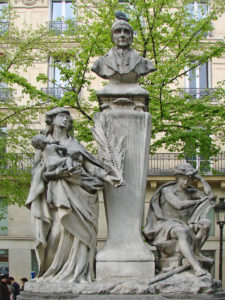The Contribution of Auguste Comte to Sociology – Theological, Metaphysical and Scientific stage

Auguste Comte was a French philosopher born on 19th January 1798 and died on 5th September 1857. His birthplace was Montpellier, France. He is known as “the father of ‘Sociology” as he was the first one to realize the importance of relating sociology with science. He has made huge contributions to the subject along with which he coined sociology as ‘the science of society or ‘the science of human behavior’.
He called the new subject invented by him “Social physics” and later explained that Sociology is a combination of Latin and Greek words that describe the new sciences. He divided the subject into two major parts. The first part was the ‘social statics’ which dealt with the forces that hold the society together. The second part was the ‘social dynamics’ which dealt with the forces that drive the social change.
He developed his major work, “Positive Philosophy”, while he was hospitalized for the course of 15 years. This work of his contained six volumes which explained that society has its own set of laws under which it is operated, similar to the physical world. His philosophy is elucidated in another important work “A Programme of Scientific Work required for the Reorganization of Society” which he published in 1822. In 1844, Comte was in love and maintained a platonic relationship with Clotilde de Vaux who was a French aristocrat and writer. He made another contribution to the subject after his beloved’s demise in 1846 which was known as the “System of Positive Polity”. In his other contribution, the “Religion of Humanity”, he let out the idea of an improved religious order that emphasized more on reason and humanity.
Since the birth, the life of Auguste Comte has been quite difficult as he was born during the French Revolution and the Industrial Revolution. Both of these revolutions lead to the division of society in his country into two major parts. The first part belonged to the revolutionary thinkers while the other part comprised the religious thinkers. The clash of opinions and the differences in thoughts lead to the birth of violent activities and conflicts which increased exponentially. All the pre-existing thoughts and beliefs about society were smashed brutally in the ongoing disputes. Auguste Comte devoted a great part of his life in solving these disputes and came up with an idea of his own that supported the scientific aspects of society. Totally neglecting the revolutionary and religious ideas, he invented his own philosophy for a new society amidst the whole turmoil. He organized the pre-existing social order and gave it a new scientific outlook and analyzed everything scientifically. The contribution of the Father of Sociology during this period is of immense importance, as it had a noticeable effect in the progressing revolutions.
According to Comte, the knowledge of a human has three branches. The understanding and thinking of a human go through three different stages. It was his theory of human thinking evolution and development. This theory was called ‘The law of three stages which is also considered a major contribution in this field. The stages depict the transformation of the human mind in accordance with the transformation of society and era. The three stages consisted of:
- Theological or fictitious stage: This was the first of the three stages that explained the world before 1300 A.D. This stage was characterized by the orthodox idea that everything is controlled by a supernatural power. In primitive times, it was believed that the social and physical society is created by God. For instance, the lack or excess of rain referred to the displeasing nature of God. The first law was further divided into 3 major stages:
- Fetishism: At this stage, primitive men believed that God resides in each and every object. Hence, they used to worship non-living things like stones, rocks, wood, etc.
- Polytheism: This stage is advanced Fetishism. It is a stage that defined that the number of Gods increased with the number of objects. For example, God of water, God of soil, etc.
- Monotheism: This is the most advanced stage of the first law which states that there is only one God.
- Metaphysical or Abstract Stage: This stage characterized the world between 1300 and 1800 A.D. It was the modification of the Theological stage. People started thinking rationally and replaced imagination with reason. This stage knocked out the concept of a concrete God and emphasized on abstract principles.
- Positive or Scientific Stage: This stage was characterized by the growth of Science and marked the era following 1800 A.D. People gave up their beliefs about God and initiated research in the wide field of science. They started believing more in statistics and factual data and converted their perception to look at the world from imaginative to intellectual.
These are some of the major contributions of Auguste Compte in the field of Sociology. A French sociologist, Raymond Aron, wrote: “Auguste Comte may be considered as the first and foremost sociologist of human and social unity.” From his birth to his death, Comte devoted his life to Sociology, and hence he very well-deserved the title of ‘Father of Sociology’ ”.
I am From Japee Institute of Information Technology, I Love to Read and Write Sociology related Concepts but I am a Techie, I can Sing, Dance and Check my Cover Songs on Youtube https://goo.gl/fxauuv
